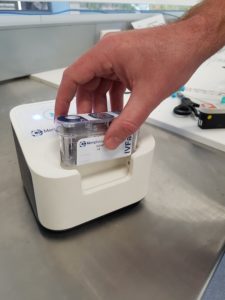Memphasys close to first sales of sperm-separating Felix device
Health & Biotech
Health & Biotech
Memphasys (ASX:MEM) shares have climbed this morning after the bio-separation company said it has started production of the most complex component of its automated sperm-separating Felix device and is targeted first sales by the end of the year.
The cleanroom at W&S Plastics in Sydney has received certification to ISO7 and ISO8 standards, which is key to ensuring the single-use Felix cartridges are manufactured sterile so they can be used for human IVF procedures.

Memphasys says the device will be the first automated, non-DNA damaging lab instrument for sperm separation. It can extract viable sperm from poor-quality samples, giving couples who might not be able to otherwise conceive because of male infertility a chance at reproduction.
The company says that unlike other sperm processing methods, the device doesn’t damage sperm DNA and it’s much quicker and easier than current laborious lab-based processes.
Now that the final build-quality cartridges are ready, Memphasys says they will be used to complete verification and validation tests for another three to four weeks.
The first sales to less regulated markets – including Japan, Canada, New Zealand and India – are expected by the end of the year, the company said.
Around noon, MEM shares were up 9.5 per cent to 11.5c.
In other biotech news:
– PolyNovo (ASX:PNV) shares were up 1.0 per cent to $2.97 after the wound care company entered markets in Belgium, the Netherlands, Luxemburg and Sweden through the expansion of an existing sales contract. Three surgical patients have already been treated with PolyNovo’s NovoSorb polymer in Belgium, PolyNovo says.
– Immutep (ASX:IMM) shares were down 6.8 per cent to 27.5c after the company completed a $29.6 million capital raising to fund develop of its immuno-oncology and autoimmune programs.
– PainChek (ASX:PCK) was down 1.1 per cent to 9.1c after receiving regulatory clearance from Health Canada for its pain assessment smartphone app, allowing it to move into the $5 billion market there. The app is used to assess pain in the people with dementia or other neurological problems that make communication difficult.